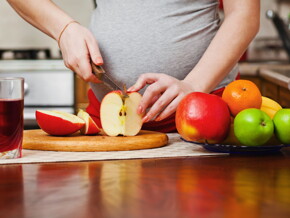
Here's What's New at 11 Weeks Pregnant
If you could look inside, you'd see thin little hairs developing on your baby's eyebrows and above the lip. It's just one of the many changes that are set to happen at week 11. Read on to find out more.
BABY DEVELOPMENT
From the tip of the head to the tailbone, your baby has now stretched to about 4 cm long, and is roughly the size of a tomato. And it’s another busy week inside you – your baby’s first fine hairs are starting to appear.
Nerve cells continue to multiply even if they aren’t connected to the brain yet. The neural circuits in the spinal cord, however, are starting to find their place in and around the muscles. That means the baby inside you will soon have reflex movements – how exciting is that?
YOUR BODY
You’re 11 weeks pregnant and the waistband of your pants is starting to dig in. If you’re feeling some breast pain, that may be a sign that your regular bra has gotten too tight.
On average, a mother-to-be weighs about 1 to 2 kg more towards the end of the first trimester. Interestingly, the baby – which is still a real lightweight at about 10 grams – accounts for the smallest part of that weight gain. Most of your added weight will be thanks to your expanded uterus, placenta, and amniotic fluid – the liquid that’s surrounding and protecting your precious cargo.
NUTRITION
Your baby needs plenty of calcium to grow, so make sure you’re getting enough calcium for the both of you.
Without proper access to sufficient calcium, your body might tap its own calcium reserves and redirect them to your baby. You could end up with bone loss during pregnancy, which could place you at risk for injury.
Foods rich in calcium include milk and dairy products such as cheese and yogurt – but be sure to check that they’re pasteurized (i.e. sterilized to be free from germs). Calcium can also be found in sesame seeds and most green, leafy vegetables.
It is generally a good idea to aim for 4 servings of dairy per day to cover your calcium needs. However, you may have specific nutritional requirements unique to your case. Your doctor, for example, may recommend that you complement a diet of foods rich in calcium with a calcium supplement. Always consult with your doctor before making any changes to your diet.
TIPS
Noticed any strong food aversions lately? Totally normal!
It’s common during pregnancy to find certain types of food objectionable – especially those with strong smells, and especially during the first trimester.
To work around these food dislikes and still get your fill of important nutrients, simply find a ‘similar’ type of food to act as a substitute, meaning one from the same food group.
So if you can no longer stand the sight of fish, try replacing it with chicken, ham, or other white meat. If you can’t manage to eat carrots, remember to get your beta-carotene elsewhere by eating other veggies or fruits rich in the same nutrient, such as sweet potato or melon.
A little creativity and resourcefulness can go a long way in ensuring that your diet stays yummy and healthy.
The last week of the 1st trimester is coming up! Click here to read all about week 12.




























